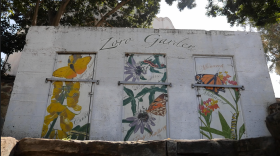A San Diego Superior Court judge Tuesday dealt a legal setback to the years-long effort to expand the San Diego Convention Center.
The case surrounds Measure C, a citizens initiative on the March 2020 ballot that would have raised the city's hotel room tax to fund a Convention Center expansion, homelessness programs and infrastructure. The measure won 65% approval — just shy of the two-thirds majority it needed for a clear victory.
A long and complex legal battle has ensued over multiple issues, including what threshold Measure C needed to win approval. Ballot materials stated the measure needed a two-thirds majority, but city leaders, the tourism industry, business groups and labor unions still want the measure validated with the simple majority it won from voters.
Tuesday's ruling from Judge Kenneth Medel focused primarily on another question: whether the City Council waited too long before declaring the measure passed.
Normally the city would be required to declare within a month whether a ballot measure succeeded or failed. But at the time, a California Supreme Court decision had thrown into doubt the longstanding rule that special taxes like Measure C need a two-thirds majority.
In April 2020, the City Council declined to certify Measure C's victory or defeat. Instead, it simply stated the vote count and acknowledged the threshold question had not been settled by the courts.
One year later, after several court decisions made clear that tax hikes via citizens initiatives need only a simple majority, the council declared Measure C approved and asked a judge to validate that decision.
The nonprofit Alliance San Diego sued the city, arguing the city had led voters to believe Measure C needed a two-thirds majority, and that the City Council had unlawfully changed the rules after the election.
"Our concern was about the power taken by City Council to ignore election law and manipulate the election to get the results that they wanted," said Andrea Guerrero, Alliance San Diego's executive director. "They waited more than a year. They held the outcome of the election open indefinitely, despite state law that said they were to have finalized that election on that day."
Judge Medel agreed, writing: "The council had no authority to delay its declaration of the result of the Measure C election or to contradict the city clerk's certified results in that declaration."
The City Council has 30 days to appeal the ruling, which must be overturned before the city can seek Measure C's final validation. Measure C's proponents can also appeal the ruling.
City Attorney Mara Elliott said the ruling "adds unnecessary delay to a matter that ultimately will be decided by the Court of Appeal or the California Supreme Court."
Mayor Todd Gloria said the city was undeterred in seeking Measure C's validation in court.
"We will continue to fight to secure the millions of dollars for homelessness and road repair that a significant majority of San Diegans voted for," Gloria said. "We continue to believe that Measure C required a simple majority to pass based on court rulings made after the March 2020 election and I support the city attorney's continued pursuit of having this matter heard on its merits."






